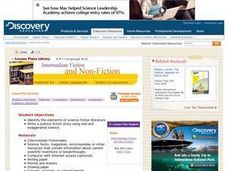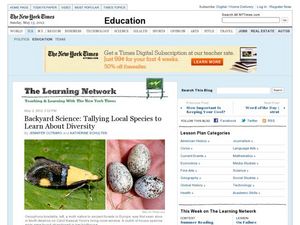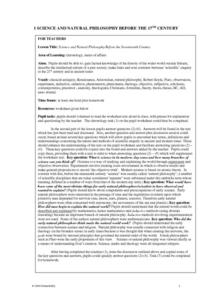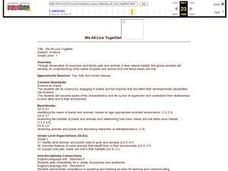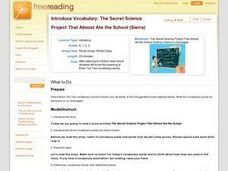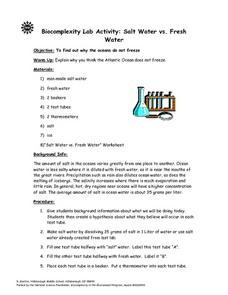Berkshire Museum
Where’s the Water?: Acting Out Science Cycles
Young scientists transform themselves into rivers, oceans, clouds, and drops of water in order to explore the water cycle. After assigning and explaining to students their different roles in the activity, the teacher reads aloud a...
Worchester Polytechnic Institute
Interactive Laboratory Activities for Secondary Education
Do you think the lab smells like rotten eggs? Sorry to hear about your sulfering. A set of five experiments covers many different topics including seasons, gravity, food, precipitation, and photosynthesis. Though not presented as a...
Curated OER
Using a Title to Determine Main Idea (Nonfiction)
Young readers explore a nonfiction text for its main idea. They will listen to the book Animal Sight by Kirsten Hall, and then observe as the teacher models a main idea think-aloud. Later, for independent practice, they listen to the...
Curated OER
Science Fiction Literature
Students identify the elements of science fiction literature. They write and illustrate a science fiction story using real and exaggerated science. In addition, they read their stories aloud in small groups.
Curated OER
New Information
Young readers explore informational texts as they read a text entitled Giant Pandas by Gail Gibbons. The teacher will begin by explaining that one characteristic of informational texts is that they teach the reader new information and...
Curated OER
Read Aloud Lesson Plan: Water for One, Water for Everyone
Students listen to a read aloud about African animals as they access a watering hole. They discuss the characteristics of Africa such as the temperature, it distance from the students, and lifestyle of the animals. They talk about how...
Curated OER
Giant Smelly Plant Attracts Thousands
Read and discuss a news article about a rare corpse plant that bloomed in Washington D.C. Because this native Indonesian plant blooms so rarely, people flock to see it. After reading the article, your class answers comprehension...
Curated OER
NASA Plans Moon Base
Students react to statements about the moon, then read a news article about NASA's plans to build a permanent base on the moon. In this space science and current events lesson, the teacher introduces the article with a discussion and a...
Curated OER
Tallying Local Species to Learn About Diversity
Using this thoroughly-written plan, you can have your junior ecologists exploring local biodiversity. They take a journal outdoors to tally the species that they see. An article is included along with comprehension questions. The author...
Rainforest Alliance
Knowing the Essential Elements of a Habitat
To gain insight into the many different types of habitats, individuals must first get to know their own. Here, scholars explore their school environment, draw a map, compare and contrast their surroundings to larger ones. They then write...
Curated OER
Old Lady That Swallowed a Fly
Youngsters listen to the story, "There Was an Old Lady Who Swallowed a Fly." After discussing the story, going over new vocabulary, and repeating the rhymes in the story, they study the parts of a fly. They finish by creating a fly on...
Curated OER
Growing Vegetable Soup
Young scholars use children's literature in order to think about the concept of creating a garden. This is done through conducting simple research about types of plants that could be grown in the area and how to care for them. Then the...
Curated OER
Science and Natural Philosophy Before the Seventeenth Century
Learners complete a worksheet about some of the natural philosophers in history. They use graph paper and create a timeline with the dates of birth and names of a list of natural philosophers. They list four questions concerning life and...
Curated OER
We All Live Together
First graders examine the lifestyle of classroom and family pets in their natural habitat. They determine the needs of plants and animals, and how those needs are met. They listen to read alouds, sing songs, and draw using computer based...
Rainforest Alliance
Sounds of the Rainforest
Do you hear what I hear? Encourage scholars to use their listening skills and participate in a series of activities that demonstrate how the sense of hearing is crucial to the human and animal world. Activities guide learners on nature...
S2tem Centers SC
Seasons
Winter, spring, summer, and fall—take the learning of the seasons beyond the elementary level to the middle school classroom. Curious learners begin by watching videos about the seasons and the rotation of planet Earth. Then, they...
Class Antics
Leap Year
What is a Leap Year and why do we have it? Find out with this Leap Day/Leap Year response to reading activity in which scholars read a short passage and use their new-found knowledge to answer five questions with short answers.
Curated OER
I Think I Forgot Something!
Pupils examine human health by reading a children's book in class. In this breakfast lesson, students identify the importance of starting the day with a good, nutritious meal. Pupils read the book I Think I Forgot Something and answer...
Curated OER
Introduce Vocabulary: The Secret Science Project That Almost Ate the School
Students discover the meaning of tier two vocabulary words. In this vocabulary lesson, students read The Secret Science Project That Almost Ate the School, listening for 3 pre-selected, tier two vocabulary words. Words are defined by the...
Institute for Teaching through Technology and Innovative Practices
The Right Number of Elephants
How can you tell if a number of items is reasonable? Combine math and language arts with a fun lesson based on Jeff Shepard's The Right Number of Elephants. After reading the book, kids discuss amounts of other items and create minibooks...
Curated OER
"What is an Engineer?"
Students describe and draw what an engineer looks like and does. They descrie what they think an engineer does. Students volunteer to read their description to the class. They use their knowledge as well as their classmate;s...
Curated OER
Drought Threatens Huge Man-Made Lake
Students locate Lake Mead, then read a news article about Lake Mead drying up and how that would effect water and power supplies to the region. In this current events lesson plan, the teacher introduces the article with a map and...
Curated OER
Salt Water vs. Fresh Water
Students explore why the oceans do not freeze. They explain why they think the Atlantic Ocean does not freeze. Students are given background information about what they are doing. They create a hypothesis about what they believe...
Curated OER
What's in the Sock?
Second graders use their sense of touch to identify a variety of objects. In this sense of touch instructional activity, 2nd graders listen to a read aloud of Sandra Boynyon's, Fuzzy Fuzzy, Fuzzy. They talk about different textures and...





